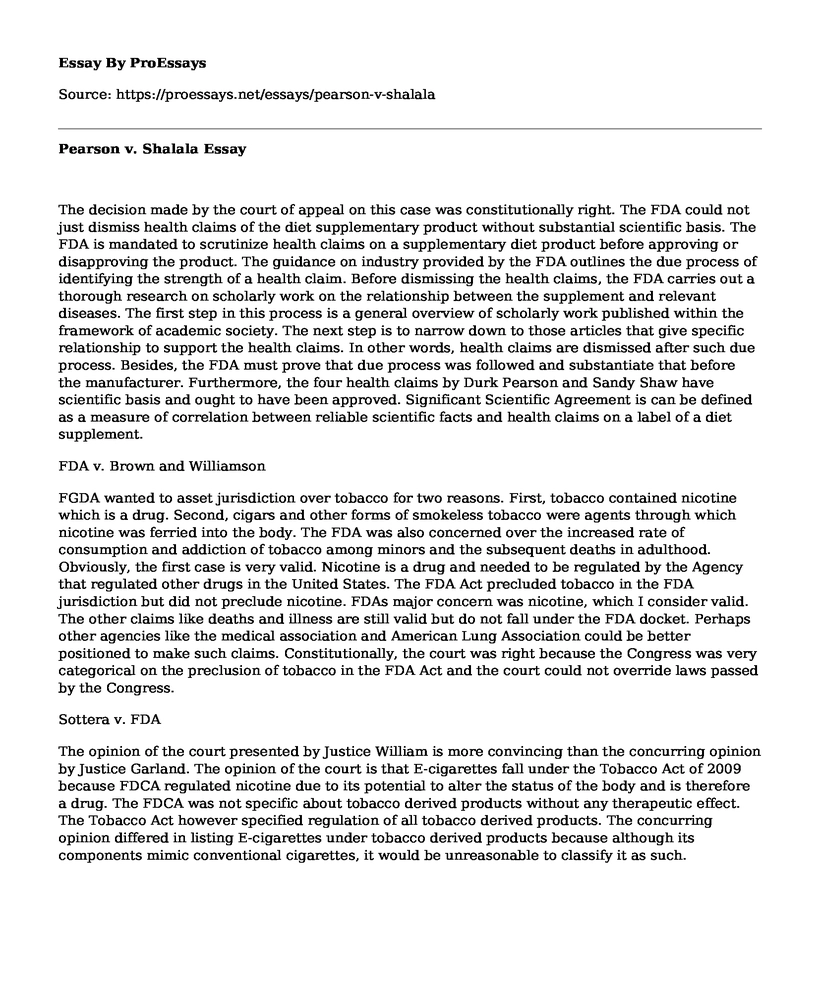The decision made by the court of appeal on this case was constitutionally right. The FDA could not just dismiss health claims of the diet supplementary product without substantial scientific basis. The FDA is mandated to scrutinize health claims on a supplementary diet product before approving or disapproving the product. The guidance on industry provided by the FDA outlines the due process of identifying the strength of a health claim. Before dismissing the health claims, the FDA carries out a thorough research on scholarly work on the relationship between the supplement and relevant diseases. The first step in this process is a general overview of scholarly work published within the framework of academic society. The next step is to narrow down to those articles that give specific relationship to support the health claims. In other words, health claims are dismissed after such due process. Besides, the FDA must prove that due process was followed and substantiate that before the manufacturer. Furthermore, the four health claims by Durk Pearson and Sandy Shaw have scientific basis and ought to have been approved. Significant Scientific Agreement is can be defined as a measure of correlation between reliable scientific facts and health claims on a label of a diet supplement.
FDA v. Brown and Williamson
FGDA wanted to asset jurisdiction over tobacco for two reasons. First, tobacco contained nicotine which is a drug. Second, cigars and other forms of smokeless tobacco were agents through which nicotine was ferried into the body. The FDA was also concerned over the increased rate of consumption and addiction of tobacco among minors and the subsequent deaths in adulthood. Obviously, the first case is very valid. Nicotine is a drug and needed to be regulated by the Agency that regulated other drugs in the United States. The FDA Act precluded tobacco in the FDA jurisdiction but did not preclude nicotine. FDAs major concern was nicotine, which I consider valid. The other claims like deaths and illness are still valid but do not fall under the FDA docket. Perhaps other agencies like the medical association and American Lung Association could be better positioned to make such claims. Constitutionally, the court was right because the Congress was very categorical on the preclusion of tobacco in the FDA Act and the court could not override laws passed by the Congress.
Sottera v. FDA
The opinion of the court presented by Justice William is more convincing than the concurring opinion by Justice Garland. The opinion of the court is that E-cigarettes fall under the Tobacco Act of 2009 because FDCA regulated nicotine due to its potential to alter the status of the body and is therefore a drug. The FDCA was not specific about tobacco derived products without any therapeutic effect. The Tobacco Act however specified regulation of all tobacco derived products. The concurring opinion differed in listing E-cigarettes under tobacco derived products because although its components mimic conventional cigarettes, it would be unreasonable to classify it as such.
Cite this page
Pearson v. Shalala. (2021, Mar 14). Retrieved from https://proessays.net/essays/pearson-v-shalala
If you are the original author of this essay and no longer wish to have it published on the ProEssays website, please click below to request its removal:
- The Effect Undocumented Labor Has on Wages in the Construction Industry
- Reasons Why Healthcare Should Be Considered as a Human Right
- The State of Confusion v. William K Defendant Case Study
- Perceptions of the Ghanaian Diaspora - Essay Sample
- Never Wanting to be a Prison Officer: The Dangers Involved
- Exploring Crime Through a Socio-Cultural Lens: Gender, Race, and Class - Essay Sample
- Essay Example on Hong Kong-China Divide: Clash of Legal Systems







